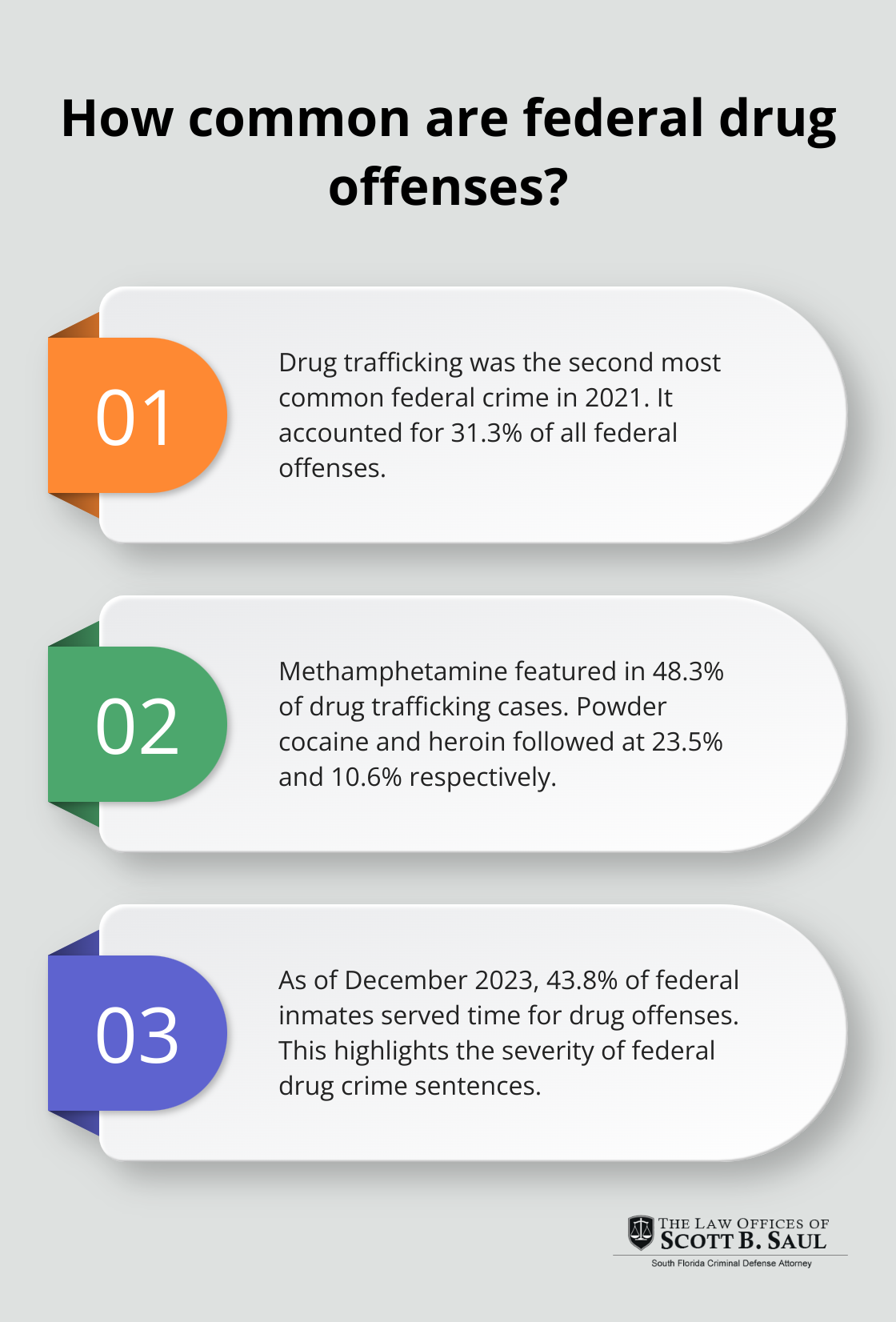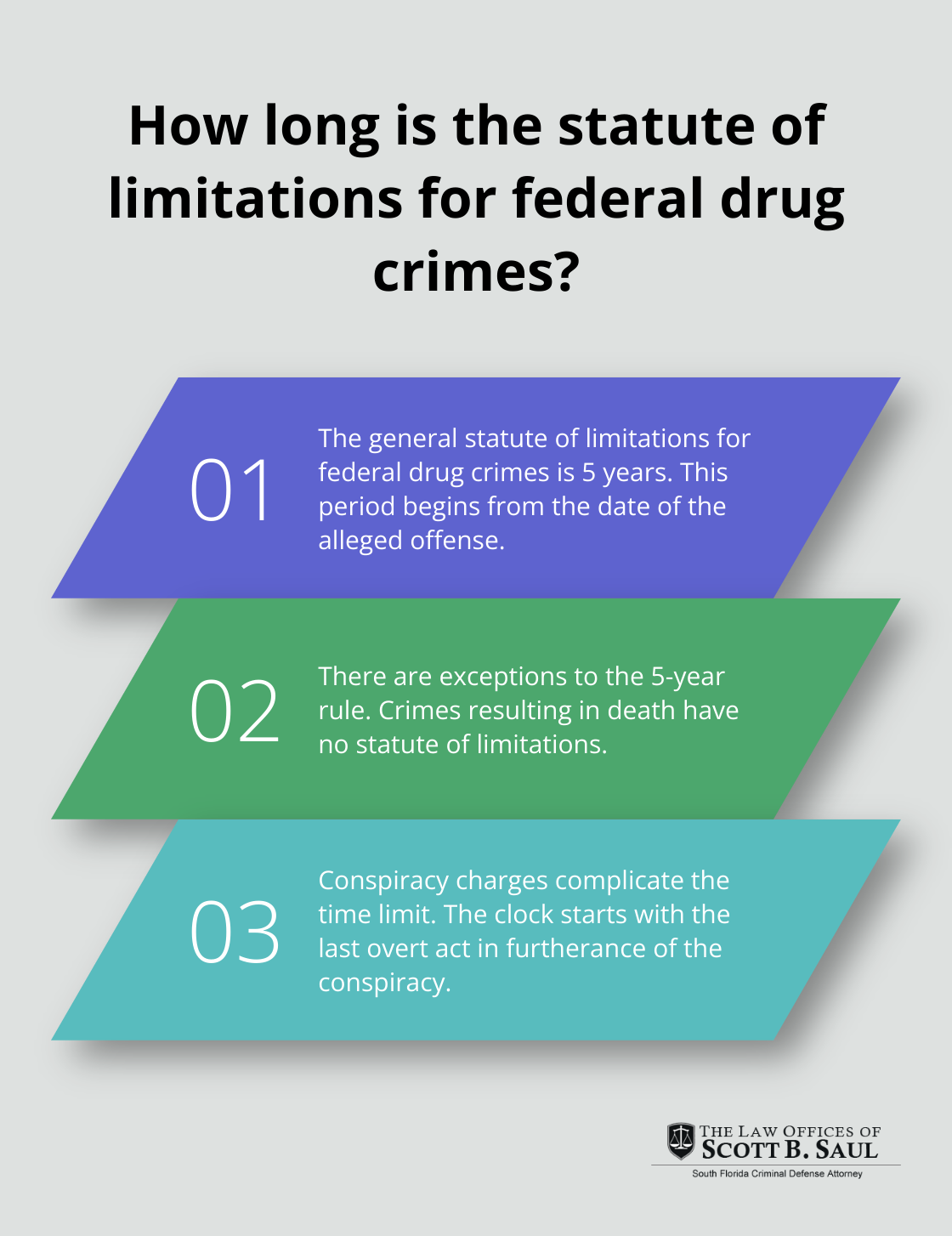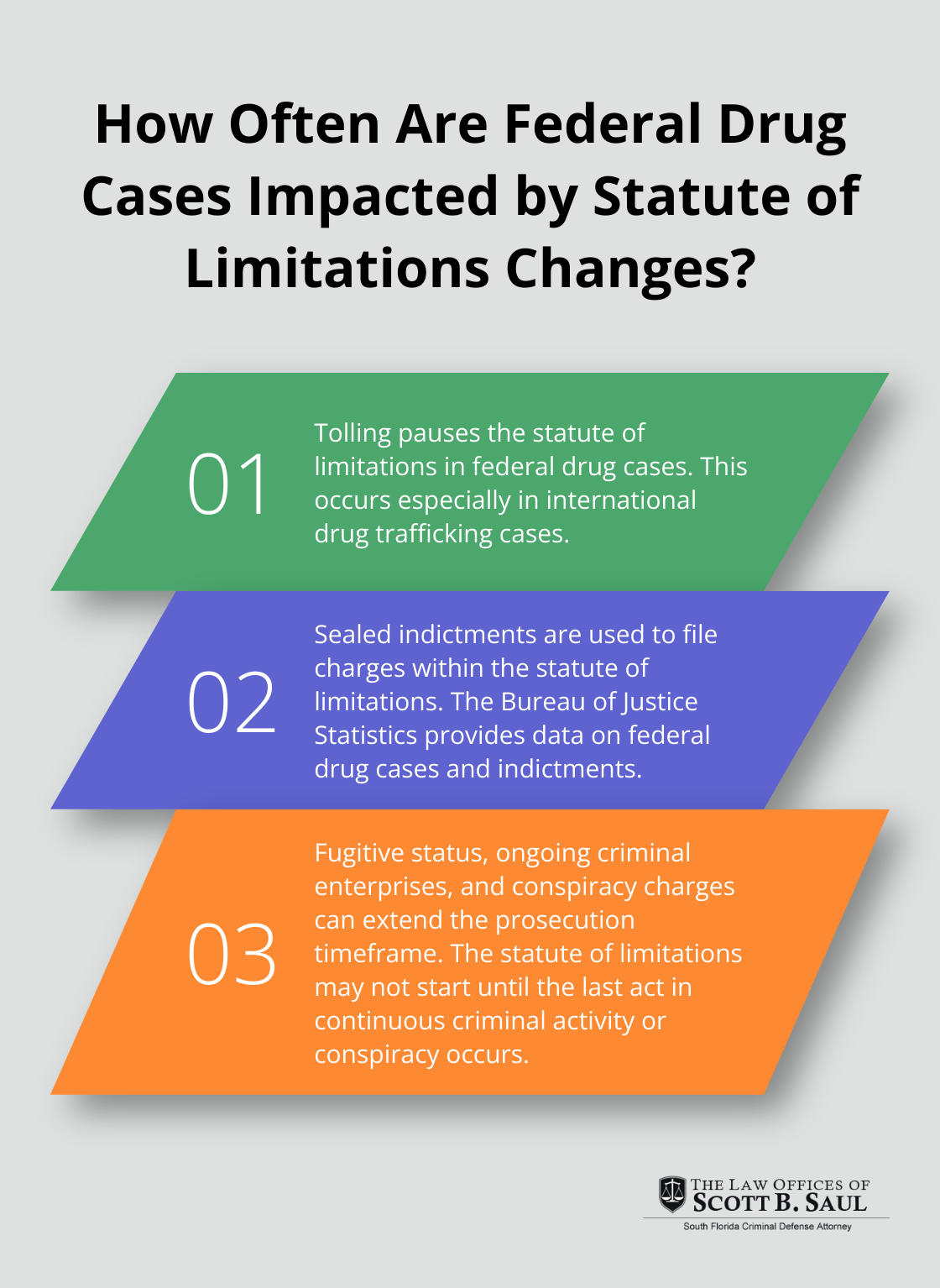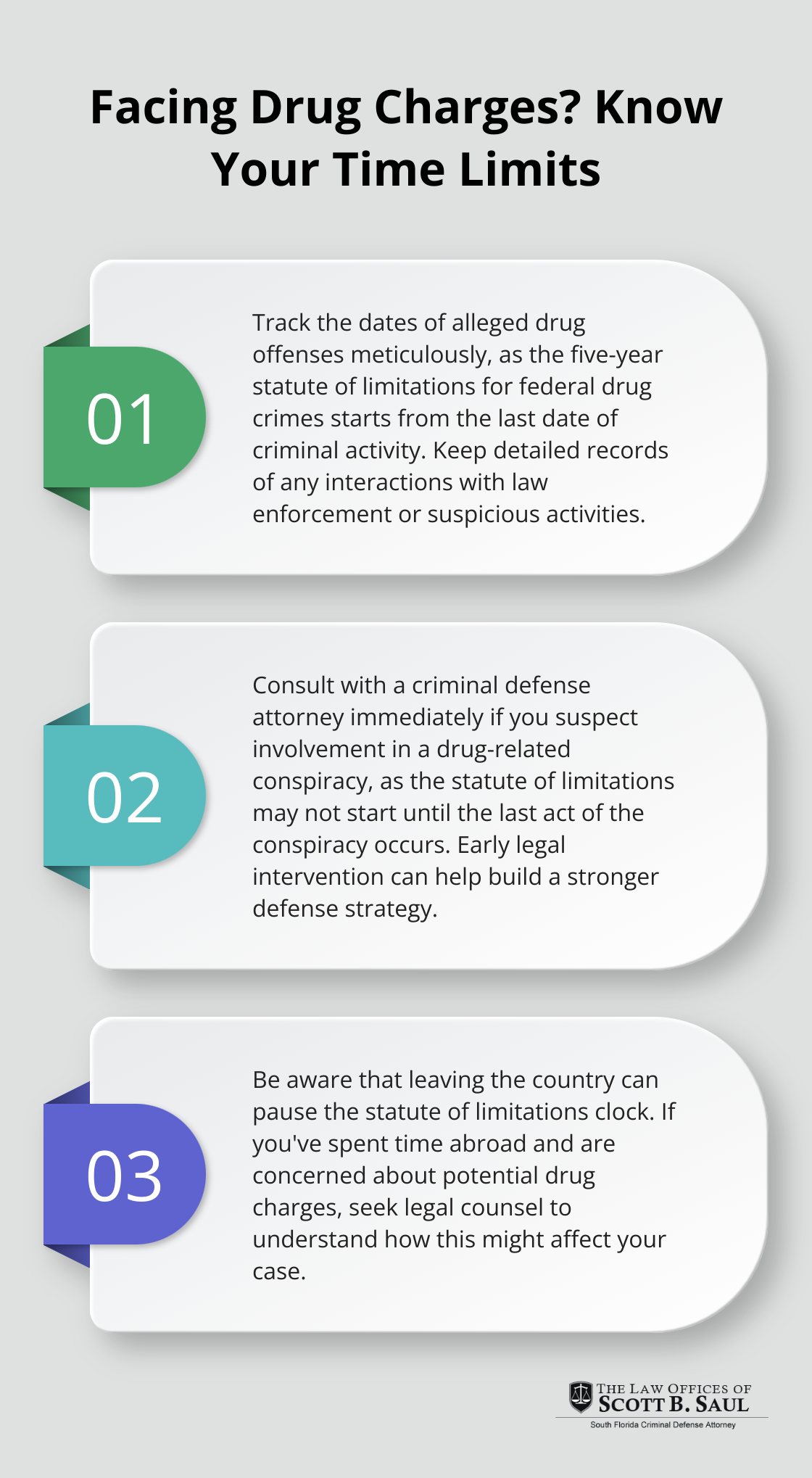Federal Statute of Limitations for Drug Offenses
By : saulcrim | Category : Criminal Defense | Comments Off on Federal Statute of Limitations for Drug Offenses
28th Dec 2024

Federal drug offenses carry severe penalties, and understanding the statute of limitations is vital for those facing charges. At Law Offices of Scott B. Saul, we’ve seen how these time limits can significantly impact cases.
This post explores the federal statute of limitations for drug offenses, its exceptions, and factors that can affect it. We’ll also discuss why early legal representation is key in navigating these complex laws.
What Are Federal Drug Offenses?
Federal drug offenses constitute serious crimes that involve the manufacture, distribution, possession, or trafficking of controlled substances across state lines or on federal property. These offenses fall under federal law and result in severe penalties, including lengthy prison sentences and substantial fines.
Types of Federal Drug Crimes
The most common federal drug crimes include:
- Drug Trafficking: This involves the transportation, sale, or import of illegal drugs across state or national borders.
- Drug Manufacturing: The production of illegal substances (e.g., operating a methamphetamine lab).
- Possession with Intent to Distribute: This charge applies when a person possesses large quantities of drugs, suggesting plans to sell or distribute them.

According to the United States Sentencing Commission, drug trafficking offenses ranked as the second most common type of federal crime in fiscal year 2021, accounting for 31.3% of all federal offenses. Methamphetamine featured in 48.3% of all drug trafficking cases, followed by powder cocaine (23.5%) and heroin (10.6%).
Federal vs. State Drug Charges
Both federal and state laws prohibit drug-related activities, but federal charges typically involve:
- Larger quantities of drugs
- Cross-state operations
- Crimes committed on federal property
Federal cases often present more complexity and carry harsher penalties than state cases. For instance, a simple possession charge at the state level might result in probation or a short jail sentence, while federal charges for the same offense could lead to years in prison.
The Federal Bureau of Prisons reports that as of December 2023, 43.8% of inmates served time for drug offenses, which highlights the severity of federal drug crime sentences.
Key Differences in Prosecution
Federal cases differ from state cases in several ways:
- Prosecution Process: U.S. Attorneys handle federal cases, while local district attorneys manage state cases.
- Investigating Agencies: Federal agencies like the DEA or FBI investigate federal cases, whereas local law enforcement handles state cases.
- Resources: Federal cases often involve extensive resources and lengthy investigations.
These differences underscore the importance of early legal representation in federal drug cases. Experienced attorneys (such as those at Law Offices of Scott B. Saul) can navigate the complexities of both federal and state courts, which proves essential for building a strong defense strategy.
As we move forward, we will explore the specific time limits that apply to federal drug offense prosecutions, known as the statute of limitations.
Federal Statute of Limitations for Drug Crimes
The Five-Year Rule
The federal statute of limitations for drug crimes typically sets a five-year window for prosecutors to file charges. This time frame starts from the date of the alleged offense. However, the landscape of federal drug crime prosecution contains more complexity than this general rule suggests.

The five-year statute of limitations applies to most federal drug offenses. If more than five years pass since the alleged crime occurred, prosecutors cannot bring charges. This rule promotes fairness in the legal system by preventing the use of stale evidence and protecting defendants from facing charges based on long-past events.
It’s important to note that the clock starts ticking from the last date of the alleged criminal activity. For example, if someone faces accusations of selling drugs over a three-year period, the five-year countdown begins at the end of that three-year span.
Exceptions to the Five-Year Rule
While the five-year rule stands as standard, several exceptions can extend this period:
- Crimes resulting in death: In such cases, no statute of limitations exists, allowing prosecutors to bring charges at any time.
- Continuing criminal enterprise offenses: These ongoing criminal activities (often involving large-scale drug operations) may not start the statute of limitations until the last act of the enterprise occurs.
Impact of Conspiracy Charges
Conspiracy charges significantly complicate the statute of limitations in drug cases. In conspiracy cases, the clock doesn’t start until the last overt act in furtherance of the conspiracy occurs. This means that even if an individual’s direct involvement in a drug operation ended years ago, they could still face charges if the conspiracy continued.
The U.S. Sentencing Commission reports that in fiscal year 2021, the number of drug trafficking cases rose 7.4%. This statistic underscores the prevalence and importance of understanding how conspiracy charges affect the statute of limitations.
Tolling: Pausing the Clock
Certain circumstances can pause or “toll” the statute of limitations:
- Fugitive status: If a suspect flees the jurisdiction to avoid prosecution, the clock stops running until they return.
- Waiver: If a defendant waives the statute of limitations (perhaps as part of a plea negotiation), this can extend the time for prosecution.
Understanding these nuances can make the difference between charges being filed or dismissed. The complexities surrounding the statute of limitations in federal drug cases highlight the importance of timely legal action. Waiting until charges are filed can severely limit defense options. Early consultation with an experienced criminal defense attorney can help individuals understand their rights and potential vulnerabilities.
The federal statute of limitations for drug crimes represents just one piece of the puzzle in building a strong defense. Next, we will explore other critical factors that can affect these time limits and discuss strategies for navigating the complex landscape of federal drug offense laws.
How the Statute of Limitations Can Change
Tolling the Statute
The federal statute of limitations for drug offenses can change under certain circumstances. Tolling, which pauses or delays the statute, extends the time prosecutors have to file charges. For example, if a suspect leaves the country to avoid prosecution, the statute of limitations stops until they return. This means that even if someone flees for years, they can still face charges upon their return to the U.S.

The U.S. Department of Justice reports that tolling occurs in federal drug cases, especially those involving international drug trafficking. The principles set forth in the Justice Manual regarding careful use of mandatory minimum charges apply with particular force in drug cases.
The Impact of Sealed Indictments
Prosecutors sometimes use sealed indictments to work around the statute of limitations. A sealed indictment is a formal accusation that remains secret until the defendant is in custody or released on bail. This tactic allows prosecutors to file charges within the statute of limitations while keeping the indictment hidden from public view.
The Bureau of Justice Statistics (BJS) is the United States’ primary source for criminal justice statistics that cover a wide range of topics, including information related to federal drug cases and indictments.
Waiving the Statute of Limitations
In some cases, defendants choose to waive the statute of limitations. This typically occurs as part of plea negotiations or when a defendant believes they can present a stronger defense if given more time. However, waiving this right is a serious decision that requires careful consideration and consultation with an experienced attorney.
Factors Affecting the Statute
Several factors can alter the timeframe of the statute of limitations, potentially extending the period during which prosecutors can file charges:
- Fugitive status: The statute pauses if a suspect flees to avoid prosecution.
- Ongoing criminal enterprise: In cases of continuous criminal activity, the statute may not start until the last act occurs.
- Conspiracy charges: The clock doesn’t start until the last overt act in furtherance of the conspiracy takes place.
Understanding these factors can significantly impact the outcome of a federal drug case. Early legal intervention allows for a thorough examination of all aspects that might affect the statute of limitations. An experienced attorney (such as those at Law Offices of Scott B. Saul) can help navigate these complex issues, potentially leading to more favorable outcomes for those facing federal drug charges.
Final Thoughts
The federal statute of limitations for drug offenses plays a pivotal role in determining when prosecutors can file charges. These time limits involve complex exceptions, tolling, and factors that can alter the timeframe. Early legal representation proves essential for anyone facing federal drug charges, as it allows for a thorough examination of all aspects that might affect the statute of limitations.

At Law Offices of Scott B. Saul, we bring decades of expertise in criminal defense to every case we handle. Our firm specializes in defending clients against federal drug charges, leveraging our experience as former federal and state prosecutors. This background equips us with insights into prosecution strategies, allowing us to build stronger defenses for our clients.
We understand the stress and uncertainty that come with facing federal drug charges. Our team provides personalized attention, comprehensive consultations, and aggressive representation to protect your rights throughout the legal process. Don’t let the federal statute of limitations for drug offenses catch you off guard. Contact experienced legal counsel today to protect your future and explore your options.
Archives
- July 2025 (1)
- June 2025 (9)
- May 2025 (9)
- April 2025 (8)
- March 2025 (9)
- February 2025 (8)
- January 2025 (9)
- December 2024 (10)
- November 2024 (5)
- July 2024 (2)
- June 2024 (2)
- May 2024 (2)
- April 2024 (2)
- March 2024 (2)
- February 2024 (2)
- January 2024 (2)
- December 2023 (2)
- November 2023 (2)
- October 2023 (2)
- September 2023 (2)
- August 2023 (1)
- July 2023 (2)
- June 2023 (2)
- May 2023 (2)
- April 2023 (2)
- March 2023 (2)
- February 2023 (2)
- January 2023 (2)
- December 2022 (2)
- November 2022 (2)
- October 2022 (2)
- September 2022 (2)
- August 2022 (2)
- July 2022 (2)
- June 2022 (2)
- May 2022 (2)
- April 2022 (2)
- March 2022 (2)
- February 2022 (2)
- January 2022 (2)
- December 2021 (2)
- November 2021 (2)
- October 2021 (2)
- September 2021 (2)
- August 2021 (2)
- July 2021 (2)
- June 2021 (2)
- May 2021 (2)
- April 2021 (2)
- September 2020 (5)
- July 2020 (4)
- June 2020 (4)
- May 2020 (4)
- April 2020 (5)
- March 2020 (4)
- February 2020 (4)
- January 2020 (4)
- December 2019 (1)
- November 2019 (4)
- October 2019 (4)
- September 2019 (4)
- August 2019 (4)
- July 2019 (5)
- June 2019 (4)
- May 2019 (4)
- April 2019 (4)
- March 2019 (4)
- February 2019 (4)
- January 2019 (4)
- December 2018 (4)
- November 2018 (5)
- October 2018 (5)
- September 2018 (4)
- August 2018 (4)
- July 2018 (7)
- June 2018 (4)
- May 2018 (4)
- April 2018 (8)
- March 2018 (4)
- February 2018 (4)
- January 2018 (4)
- November 2017 (4)
- October 2017 (4)
- September 2017 (4)
- August 2017 (7)
- July 2017 (6)
- June 2017 (4)
- May 2017 (4)
- April 2017 (4)
- March 2017 (4)
- February 2017 (7)
- January 2017 (4)
- December 2016 (7)
- November 2016 (4)
- October 2016 (4)
- September 2016 (10)
- August 2016 (4)
- July 2016 (4)
- June 2016 (4)
- May 2016 (4)
- April 2016 (4)
- March 2016 (4)
- February 2016 (7)
- January 2016 (4)
- December 2015 (5)
- November 2015 (4)
- October 2015 (7)
- September 2015 (4)
- August 2015 (4)
- July 2015 (13)
- June 2015 (9)
- May 2015 (8)
- April 2015 (6)
- March 2015 (4)
- February 2015 (4)
- January 2015 (4)
- December 2014 (4)
- November 2014 (4)
- October 2014 (4)
- September 2014 (3)
Categories
- Adjudication (1)
- Bankruptcy (1)
- Burglary Crimes (3)
- calendar call (1)
- Car Accident (1)
- Criminal Defense (332)
- Cyber Crimes (7)
- DNA (1)
- Domestic Violence (9)
- Drug Crimes (5)
- DUI (12)
- Embezzlement (1)
- Environmental Crimes (4)
- Expungement Law (2)
- Federal Sentencing Law (3)
- Firearm (3)
- Forgery (4)
- General (82)
- Healthcare (3)
- Immigration (1)
- Indentity Theft (1)
- Insurance (5)
- judicial sounding (2)
- Juvenile Crimes (4)
- Manslaughter (4)
- Money Laundering (3)
- Organized Crime (1)
- Racketeering (1)
- Reckless Driving (3)
- RICO (3)
- Sealing and Expunging (2)
- Sex Offense (1)
- Shoplifting (1)
- Suspended Driver's License (1)
- Traffic (4)
- Trending Topics (1)
- White-collar Offenses (1)

